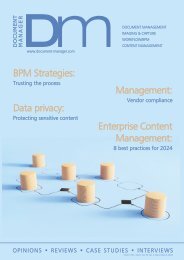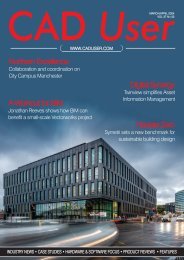NC Feb-Mar 2023
You also want an ePaper? Increase the reach of your titles
YUMPU automatically turns print PDFs into web optimized ePapers that Google loves.
FEATURE: DATA PERSPECTIVES<br />
warehouses. Legacy systems are also finite by<br />
design, meaning with scaleup additional<br />
storage is required; business growth, therefore,<br />
comes with the problem of increased<br />
hardware investment. At the time these systems<br />
were built when green initiatives were not<br />
commonplace either, so hardware cannot be<br />
significantly optimised for sustainability goals.<br />
They are also more costly to maintain, with<br />
breakdowns the sole responsibility of the<br />
business. Hardware systems represent a single<br />
point of failure, if severe breakdowns or<br />
external issues such as damage occur,<br />
business operations come to a standstill.<br />
Considering this, businesses must seek<br />
modern data-driven solutions, to decide<br />
which strategy is most applicable a whole host<br />
of technologies must be explained.<br />
THE SYSTEMS OF DATA-DRIVEN<br />
EVERYTHING<br />
Cloud systems often form the base of a<br />
company's digital transformation. When<br />
compared to legacy systems, cloud is a more<br />
resilient, cost-effective, faster, greener solution.<br />
Cloud providers place connected data houses<br />
in various locations, nullifying breakdown or<br />
damage risks. Cloud can also be optimised<br />
quicker and more minutely, meaning<br />
optimisations for speed of processing are<br />
more easily made. Cost efficiency is a key<br />
component, cloud providers such as AWS<br />
scale cloud computing costs based entirely on<br />
usage, meaning businesses only pay for what<br />
they need and are ready for scale-up at any<br />
given moment. Providers also cover all<br />
optimisation and problem fixes internally.<br />
Most cloud providers also run operations on<br />
green energy, aiming for carbon neutrality by<br />
2050, benefitting cloud-based businesses'<br />
green credentials.<br />
All of these benefits provide a foundation for<br />
faster data collation and access, allowing<br />
businesses to act on data insights in real time.<br />
Cloud systems are also exceptional at<br />
removing unnecessary manpower resources<br />
away from maintaining IT systems, meaning<br />
resources can instead be directed toward<br />
diligent data analysis.<br />
DATA LAKES<br />
Businesses reliant on legacy systems collect<br />
data from various siloed systems, the adverse<br />
effect of this is data mismanagement and an<br />
overall lacking of the 'bigger picture'.<br />
Naturally, storing data in siloed systems<br />
reduces the speed and accuracy of which<br />
data can be acted on. A data lake removes<br />
these issues by collating structured and<br />
unstructured data regardless of scale. From<br />
here, the now-centralised data can be utilised<br />
for machine learning, big data processing<br />
and real-time analytics.<br />
The effect of implementing a data lake on<br />
bottom lines can be considerable, with<br />
research showing companies with data lakes<br />
boasted 9% more organic growth revenue<br />
compared to competitors that had siloed data<br />
systems. The reasons for this are likely that<br />
data lakes offer speedier, more accessible and<br />
accurate insights; research details that 87% of<br />
companies with a data lake believe decisionmaking<br />
markedly improved. Additionally, 92%<br />
of leaders trust data lakes to be the most<br />
effective solution for centralising data. In<br />
comparison to data warehouses - data lake's<br />
predecessor - the modernised solution also<br />
comes with a lower cost of ownership.<br />
Ultimately, data lakes are a foundational<br />
component for businesses realigning to a<br />
data-driven perspective. The centralised data<br />
system enables quicker reactivity to market<br />
changes, synergised collaboration between<br />
separate departments and more informed,<br />
impactful business decisions.<br />
AI AND ML<br />
With AI and Machine Learning (ML) you get<br />
what you put in, literally. The more a business<br />
gears itself toward AI and ML the stronger data<br />
outcomes will be. Likely, businesses are already<br />
leveraging AI in back-end and customer-facing<br />
applications, but the importance of continuous<br />
efforts toward ML can be neglected. Once<br />
businesses have a firm grasp on centralised<br />
data collation and analysis, they can begin to<br />
input this data into ML. As this process<br />
continues, ML becomes intelligent enough to<br />
impact the sophistication of AI because data<br />
interpretation can be used to create highquality<br />
insights.<br />
Businesses that produce an effective databased<br />
system to nurture ML and AI will<br />
produce a high detail analysis of how a<br />
business is operating and how clientele utilise<br />
the company's service. Ultimately, this allows<br />
businesses to accurately optimise areas they<br />
have identified as inefficient.<br />
A DATA-DRIVEN FUTURE<br />
The opportunities available to businesses<br />
willing to realign to data-first systems and ways<br />
of working are clearly demonstrated. Efficiency,<br />
accuracy and future-proofing are key benefits<br />
of data-driven investment. Businesses shouldn't<br />
focus on adopting the whole breadth of digital<br />
transformation technologies, but a carefully<br />
curated digital transformation plan will give<br />
them the best chance of market<br />
competitiveness, the edge over more stubborn<br />
competitors, and an overall more effective and<br />
diligent operation. The technology and<br />
expertise are in place to transform whole<br />
sectors in <strong>2023</strong> - businesses leveraging data<br />
to empower decisions will gain advantages in<br />
the immediate future and beyond. <strong>NC</strong><br />
WWW.NETWORKCOMPUTING.CO.UK @<strong>NC</strong>MagAndAwards FEBRUARY/MARCH <strong>2023</strong> NETWORKcomputing 25

















